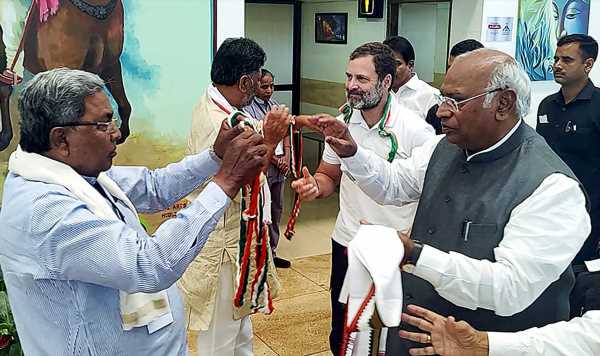The two main factions in Karnataka’s Congress party — one led by Siddaramaiah and the other by D K Shivakumar — are both contenders for the chief ministership.
Both groups have fought hard to get their choice of MLAs the party ticket, notes Aditi Phadnis.
It could have been the Cuban cigars. Or it may have been hard-nosed bargaining and a recognition of the facts of life.
When Balasaheb Thackeray and Pramod Mahajan entered into seat adjustment on behalf of the Shiv Sena and the Bharatiya Janata Party in 1989, it was Mahajan who did much of the heavy lifting in persuading his own party that the balance of advantage would ultimately lie in favour of the BJP.
Among other things, Balasaheb’s derisive references to the BJP as ‘Kamalabai’ conveyed to Sena workers a sense of braggadocio that sometimes irritated Mahajan and co.
Murli Manohar Joshi told Business Standard privately once that he had taken great care to never share a platform with Thackeray because of that leader’s fundamentally anti-Constitutional stance.
“My party may be in alliance with them, but I will never endorse this kind of politics,” Dr Joshi had said.
Cigars could disarm Thackeray. But selling the deal to his own party was far more difficult and Mahajan had to convince top leaders that the BJP would only gain, not lose, by the arrangement.
Political negotiation between two parties is a rare art because you have to package tactical losses as strategic victories.
Protocol and hierarchy matter a lot — if the other side feels you lack organisational heft, it will not take you seriously.
The alliance between the Shiromani Akali Dal and the BJP broke down ostensibly because of the farm laws.
But Naresh Gujral, the SAD’s principal alliance negotiator, confessed that talking to the BJP was “so much easier” when Arun Jaitley was alive.
The relationship between the BJP and the Biju Janata Dal in Odisha was an intricate balance between managing the frustrations of state BJP leaders like K V Singh Deo, Dharmendra Pradhan, and Juel Oram and marketing the USP of the alliance to the BJD, while keeping ears cocked for activity by smaller parties that had the potential of upending the BJD.
The alliance worked for a decade, but in 2009, Chandan Mitra, then BJP MP, was despatched as L K Advani’s personal envoy to review the arrangement but had to concede failure.
Many felt the hierarchy asymmetry between Naveen Patnaik and Mitra was one reason; but the BJP’s state unit too rejected Mitra’s intervention.
Senior Congress leader Ghulam Nabi Azad’s recent autobiography describes some of the travails of a political negotiator.
He says it was crossed wires between two centres of power in the Congress — Sonia Gandhi and Rahul Gandhi — that led to Himanta Biswa Sarma’s exit from the party to the BJP.
Sonia Gandhi told him to reassure Mr Biswa Sarma.
Rahul Gandhi told him to ‘let Biswa Sarma go’.
Another negotiation, undertaken by S S Ahluwalia, then a Union minister, on behalf of P V Narasimha Rao, in Tamil Nadu after G K Moopanar’s rebellion in 1996 won the battle for the Congress but lost the war: Because of Mr Ahluwalia and Rao’s efforts, the Congress succeeded in tying up with the All India Anna Dravida Munnetra Kazhagam.
Moopanar was opposed to the alliance, and he left the Congress and formed the Tamil Maanila Congress.
The AIADMK alliance lost the 1996 assembly election (and also the Lok Sabha elections) resoundingly and the Congress yielded its political space to the Tamil Maanila Congress.
The operation was successful, but the patient died!
Of course, the path of a negotiator is studded with landmines, as Digvijaya Singh, Congress general secretary, found in 2017.
The Congress won 17 seats in the 40-member Goa assembly and needed the support of just four MLAs to form the government.
Either Mr Singh did not have the mandate or he dawdled over negotiations with independent MLAs and, in the time taken by the party to select a leader, the BJP, with 13 seats, moved fast to secure the support of smaller parties and Independents to stake claim to form the government.
For the Congress, negotiation failed before it even started.
In the coming days, negotiation is going to be put to the test as never before.
In Karnataka, the Congress has a good chance of returning to power, but the two main factions in the state party — one led by former chief minister Siddaramaiah and the other by D K Shivakumar — are both contenders for chief ministership.
You can become chief minister only if you have the MLAs.
Both groups have fought hard to get their choice of MLAs the party ticket.
To pacify the leaders, the Congress reckons anything between 15 and 20 assembly seats have been given to ‘wrong’ people: Those who have no chance of winning.
There’s a lesson somewhere for the BJP too: When the principal negotiator himself becomes a political actor, there’s a problem.
BJP Organising Secretary B L Santhosh’s ambitions have collided with B S Yediyurappa’s and the net loser could be the BJP.
However, the biggest negotiation test will be for Nitish Kumar ahead of the Lok Sabha elections next year.
Unlike many in the Opposition, the Congress believes a one-to-one contest between it and the BJP is absolutely no guarantee of victory.
But they’ve given Nitish the go-ahead to try. So, are they setting him up for failure? Nitish is no novice at this game.
But where his negotiations will take India will be clear only in 2024.
Source: Read Full Article




